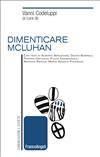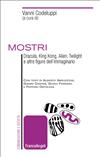
Marshall McLuhan è scomparso nel 1980, ma le sue idee continuano ancora oggi ad attirare l’attenzione e a fare discutere. I diversi autori presenti in questo libro cercano di riflettere su come sia possibile fare evolvere le sue idee, nella consapevolezza che, per ottenere questo risultato, sia necessario in un certo senso “tradirle”. Sia necessario cioè, paradossalmente, cercare di “dimenticare McLuhan”.
cod. 246.19







